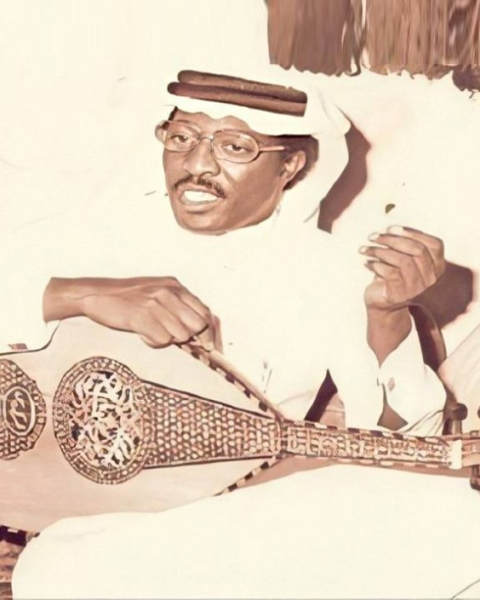
Omar Noah Fallatah (Kadars) (1933-2002) was a pioneering Saudi musician and a song figure in the Kingdom of Saudi Arabia. Nicknamed 'Omar Kadars', he played a pivotal role in establishing the modern school of Saudi music and introduced Saudi songs and composers to a wider international audience. His compositions form a significant part of Saudi music history. He mentored Mohammed Abdu and composed some of his most famous songs. Notably, Kadars was the first to compose and sing a song about Thursday, which was once a weekly holiday in the Kingdom.
Omar Kadars' talent impressed Umm Kulthum so much that she asked him to compose music for two of her songs. He also composed for many Saudi and Arab artists, including Talal Maddah and Wadih al-Safi. Considered one of the most skilled oud players in the Kingdom, some compared him to Baligh Hamdi. He prioritized quality over quantity, composing only three to five melodies a year. However, his compositions continued to be broadcast for over half a century in the Kingdom and the Arab world.
Omar Kadars was one of the pioneers who introduced innovative musical concepts. Several Saudi artists and composers were his students. He lived for sixty-seven years, forty of which he dedicated to composing. His work resulted in numerous iconic songs in the history of Saudi music, such as 'Laylat Khamis', 'Ya Sariyah Khabrini',and 'Ya Mawqed al-Nar', in addition to many traditional songs about various provinces of the Kingdom. Furthermore, his compositions made many artists famous.
The life of Omar Kadars
Omar Noah Fallatah was born in Makkah al-Mukarramah City, in al-Misfalah Neighborhood. His family moved to al-Madinah al-Munawwarah City less than a year after his birth. He and his family experienced difficult circumstances due to poverty and hardship, which forced him at a young age to focus on earning a living. When he was young, he worked in construction and house painting besides continuing his education. He then found a job that required traveling between al-Madinah al-Munawwarah City and Makkah al-Mukarramah City, working as a truck driver's assistant for a period. Eventually, he secured a position as a private driver for a prominent figure in Makkah al-Mukarramah City.
The story of Omar Kadars nickname
Omar Noah was given the nickname 'Omar Kadars' following an incident at school. Once upon a day, his teacher asked him to supervise the class in his absence and ensure discipline. Noah took the task seriously and performed it flawlessly, impressing his teacher upon his return. The teacher described Omar's firmness and discipline in front of his classmates as a 'lesson' (dars), saying, 'You stand before them like a lesson' (Kadars). His classmates picked up the word and began calling him 'Kadars', a nickname that stayed with him until his death.
The beginnings of Omar Kadars
Omar Kadars began his artistic career in the early 1960s, performing at weddings and celebrations. He sang Umm Kulthum's songs, religious hymns, Hejazi danat, and various musical pieces. His popularity soared in Jeddah City. Despite his inclination towards composing, he ventured into singing and released a studio album titled 'Tadallal' featuring six songs. However, his album did not achieve the same fame as his compositions, particularly those he created for Mohammed Abdu. Kadars is considered the mentor who nurtured Abdu's talent, enriching his artistic culture, broadening his musical horizons, teaching him to play the oud, helping him select songs, and introducing him to the Arab world.
Kadars worked for a prominent figure in Jeddah City before he turned twenty. One of Jeddah's diwaniyas marked the beginning of Omar Kadars' musical journey. There, he met a group of artists and introduced people to his talent and extensive musical knowledge. He played a variety of musical styles, including Levantine, Majrour, Andalusian, Moroccan, Egyptian, Hejazi, Yemeni, and Gulf music.
The melodies of Omar Kadars
Omar Kadars collaborated with numerous poets and artists. Among the singers for whom he composed was Talal Maddah, for whom he created songs such as 'Ya Sariyah Khabrini', 'Ya Mawqed al-Nar', 'Sah al-Tayr', and 'Maqbool Minnak'. He also composed many songs for Mohammed Abdu, including 'Laylat Khamis', 'Ya A'adhab al-Hob'.
'Ahla Min al-Uqed Libbasah', 'Zal al-Tarab', 'al-Bu'd' Taal wal-Nawa', and 'Ya A'arus al-Roba al-Habeeba'. Additionally, he composed multiple songs for Ibtisam Lutfi, Ali Abdulkarim, and Mohammed Omar, as well as Wadih al-Safi and Hiyam Younis in Lebanon and Mohammed Tharwat in Egypt.
Laylat Khamis song melody
Omar Kadars is regarded as the first to compose and sing a song about a Saudi public holiday. He is the composer of the poem 'Laylat Khamis' by Prince Khalid Bin Yazid. It is considered one of the fastest songs he ever composed, as he set it to improvise its melody immediately after reading the first verse. He first performed it at the radio theater. Subsequently, Mohammed Abdu was captivated by the song and added a musical introduction, performing it live on stage at a concert in Cairo. The song gained popularity and has been associated with Kadars since the 1980s.
Positions held by Omar Kadars
Omar Kadars was appointed as an employee in the music department of Saudi Radio. He was selected to be a member of the committee for approving musical projects and was later promoted to a position in the folk songs department of Jeddah Radio. This was his last position, which he held until his retirement. In his later years, he stopped producing music due to deteriorating health. In 2002, Mohammed Abdu introduced him on stage at Jeddah Ghair Festival and asked him to lead the band in a tribute to Kadars' contributions to Saudi music. Abdu introduced him, saying, 'My teacher and lifelong companion, Omar Kadars, will lead the next song.'
Related quizzes
Related articles


